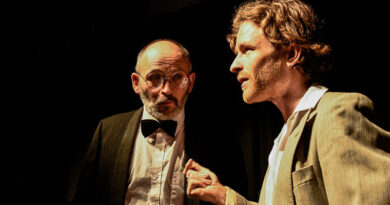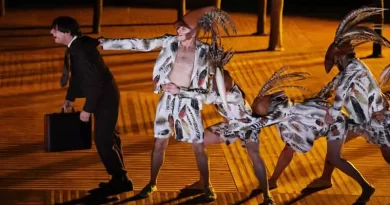Edinburgh Fringe 2021: Jeremy Malies diary
Jeremy Malies in Midlothian
5 September 2021
Edinburgh has an “after the Lord Mayor’s show” feel to it this year except there hasn’t even been a Lord Mayor’s show. It’s hard to fill my agenda given the sensible editorial stipulation that I must see live shows only (what would be the point of travelling to Scotland to watch Internet streams?) and my own rule that I’ll never review a piece whose title involves a weak laboured pun or a feeble play on words. Areas of the city in which I would normally instinctively brace myself to jostle with crowds are empty; while the Royal Mile is busy, it’s thronged only with tourists and hawkers of knick-knacks. Gone are the charismatic young actors performing extracts from their productions, and in these print[1]frugal times I’m not handed a flyer all week. Despite the limited offerings, I strike lucky with the first show on the evening of my arrival while still lugging my suitcase. I’ve heard my fair share of foul language but even I blanched some ten years ago at one of the Edinburgh local grudge match “derby” soccer games between Hibs and Hearts at the former’s Easter Road stadium. I had resolved to see the reverse fixture at Hearts’ Tynecastle ground – which I do this year, sort of.
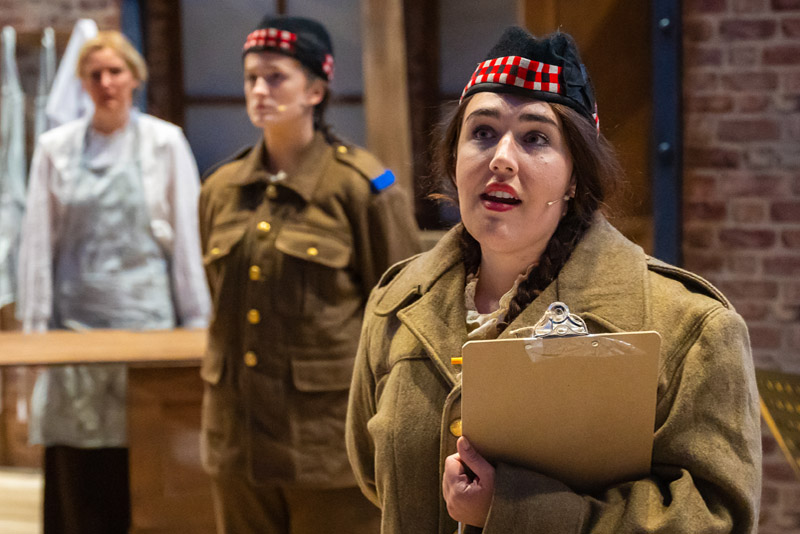
Rachel Macpherson-Graham and cast members in Sweet FA.
Photo credit: Simon Messer.
Sweet FA (whose title involves a decent pun) by Paul Beeson and Tim Barrow is performed on a stage within the terraces of the Tynecastle stadium. It depicts women during World War One manufacturing boots in Edinburgh for men fighting in France and Belgium, many of the soldiers being their husbands and sons. In the absence of organized sport, they set up a football team and take part in a league at a time when women’s sport is being galvanized across England and Scotland. Somewhat predictably (though it’s a well-documented fact), they play a game at Tynecastle against a Hibs team. The sound designer (uncredited) needs only to introduce a few crowd noises, and we have site[1]specific theatre of the highest order with the venue itself becoming a vital force within the drama.
The writing at times breaks into poetry with rhyme, half-rhyme, and assonance. The assured part-singing (some of it resembling sea shanties) is exquisite with a permanent on-stage guitarist. Principal actor Elspeth Turner also excels on violin with Matthew Brown’s original music. The choreography is inventive: it contrives to have the women dancing a jig only to morph into circuit training or juggling footballs. The authors are however guilty of trying to cram too much in – there is a clumsily handled tentative lesbian affair, and the Suffragette movement is a backdrop when my understanding is that women all over the UK gave up this cause between 1914 and 1918 to concentrate on the war effort.
Beeson and Barrow prove sure-footed with dramatic irony. They toy with our sense of prescience. We hear the factory forewoman describing the onset of the 1918 influenza pandemic: “People in Europe are being told to wear masks over their faces. Imagine that!” Corruption among football officials of the time foreshadows the scandals involving alleged bribery that engulf the game today. This backdrop is dealt with skilfully. There is some delightful reflection on the contemporary phenomenon of “mansplaining” involving, inevitably, the offside rule.
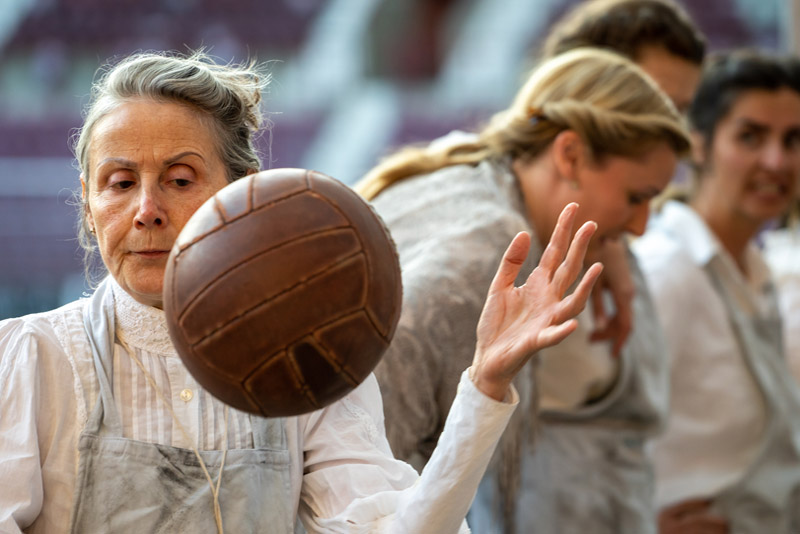
Heather Cochrane and cast members in Sweet FA. Photo credit: Simon Messer.
If there is a human chameleon working on the English-speaking stage today, it’s Pip Utton. I’ve seen him perform credibly as Adolf Hitler, Albert Einstein, Charles Dickens, Charlie Chaplin and Winston Churchill. He has the gift of delivering monologues in such a manner that you come out feeling informed but without the sense of having received a lecture. A character actor specializing in but not restricted to monodramas, Utton has made a brave choice in his current show within a marquee at the Pleasance Courtyard. He portrays, indeed inhabits, the Irish-born British painter Francis Bacon (1909-1992) in a piece he co-wrote with Jeremy Towler. It is directed by Geoff Bullen, a RADA course director.
Utton’s diffident entrance wearing the kind of three-quarter[1]length leather coat in which Bacon (also sporting fishnets) used to cruise Soho looking for rough trade sexual encounters is spectacular. He has already launched a monologue with no distance between character and the seemingly spontaneous stream of reminiscences set off by the actor’s mimicry when depicting other figures in Bacon’s life. The anecdotes come in torrents, and my Covid mask falls off, so hard am I laughing at the (factually correct) recollection that Bacon met one of his significant others (boyfriend George) when George had invaded his flat as a cat burglar. We are told later that George only learnt to read and write when Bacon gave him a cheque book!
The conceit is that Bacon is a ghost and is in a limbo where he’ll be picked over by art critics for eternity. He is desperate to be liked. A repeated theme is that he required chaos to produce images and could not paint “the happier side of life”.
This is closely observed acting of the highest order. After the second bottle of champagne there is something of a Jeffrey Bernard tone as well as gales of louche humour of the Joe Orton cottaging mode that Alan Bennett now uses occasionally. It’s all un[1]politically correct: “Once upon a time being a homosexual was really exciting. Now it’s like a disability – like a limp.”
There’s deft wordplay throughout. I noted: “Welcome to the concentration of camp” and “I wish champagne for my real friends and real pain for my sham friends”, a remark that is also attributed to Tom Waits. Now there’s an odd pairing.
Bacon refused a knighthood twice and having changed his mind he blotted his copybook by ridiculing Princess Margaret in a London nightclub while she was attempting to sing Cole Porter songs. He says, “They said I was the greatest painter since Turner but if you looked around at the competition it wasn’t much of a compliment.” This is an interesting comparison, but Bacon is on record as saying that he sought to make himself a work of art. He wanted to capture the beauty of an image without the boredom of its conveyance. Turner, by contrast, immersed himself in what he saw as a craft and was always happy to talk about technicalities.
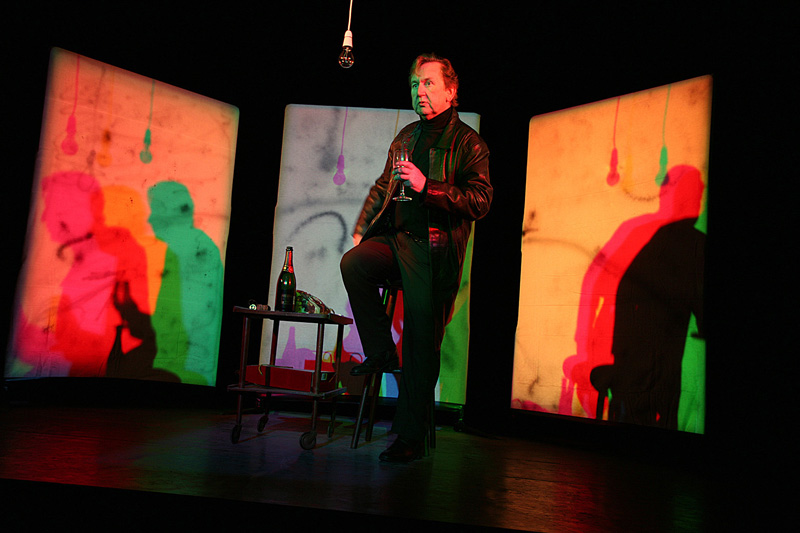
Pit Utton as Francis Bacon. Photo credit: Alex Nickolaus.
Reviewing one of Alan Bennett’s Talking Heads at the Bridge Theatre in London when British society opened up briefly after the first lockdown, this magazine’s critic Jay Paul Skelton said that a danger of writing a theatre review during a pandemic is that your article is not about the show itself but about the experience of going to the theatre in difficult circumstances. Like Jay, I have tried to avoid this but it has to be said that Bacon was a case in point. I arrived at the Pleasance Courtyard in torrential rain and one of the marquees had collapsed under the weight of the water; I discovered there was no physical box office, and I was obliged to buy a single can of coke by ordering it from the bar online via an App that I had to download. The (predominantly English) ushers couldn’t understand me through my mask, and I couldn’t scan a Covid track & trace QR code because the Scottish public health system doesn’t communicate with the English one. Fortunately, the play itself quickly took my attention. Like his persona here, Pip Utton is also a work of art. As he came out of character to talk to us, he was particularly disarming. He downplayed the many audience compliments. It made me think of Bacon’s own vein of self-effacement: “I can only hope to catch things with a very lucky dash of paint.” Utton’s own creative palette is precise and mesmerizing.
Shamefully late in life, I made my first visit to Berlin five years ago. Dwarfing everything else on my agenda was the Berlin Wall Memorial near a promenade opposite the Reichstag Building. The memorial commemorates the 140 (conservative guesstimate) people who died trying to escape to West Germany. Some time around the millennium at Edinburgh I saw a fine play (it won’t Google) about a group of idealistic West German teenagers who scaled the wall the other way in search of altruistic values and group endeavour in the GDR.
So, with much interest on my second day in Edinburgh I traipse out north of New Town to an army drill hall where Further Theatre Company are performing Tunnels which depicts two cousins, Paul and Freddie, digging their way from the DDR towards the U-Bahn railway tunnel that leads to West Berlin. Playwright Oliver Yellop makes the always questionable decision to appear in this two-hander himself; it’s a relief to see in the programme notes that he hasn’t directed as well. Tunnels is a shocker from the off. Initially, I think the ear-splitting sound effects by Fergal Mulloy are a taster of auditory torture awaiting the diggers if the Stasi intercept them. But no, this really is the sound design, and several people rush for the exit covering their ears. I want very much to leave but think of rules drummed into me by my seniors when I was a cub reporter. “If you’re on a press ticket you arrive (though needn’t necessarily leave) sober and above all, you must stay to the end.” More people are slipping out. You’d think Broughton Street, the main road down to Edinburgh city centre, is the U-Bahn to salvation sought by the two young men.
Perhaps I’m simply never absorbed but this felt like playwriting by numbers. You can guess each narrative stage and hear the plot creak. “Ah! Drama revolves around conflict. I’ll have the tunnellers argue about their best way forward.” More annoying still are the lightly paraphrased chunks of 1984 as Paul (Lewis Bruniges) describes his experiences as a dissident, including the interrogations he has undergone previously.
One of the few coherent themes to emerge is Paul’s cynicism about the DDR which is based on never seeming to get a payback from the authorities despite blind loyalty. There is much technical discussion about digging and acoustics, but a supposed ratcheting-up of tension as the tunnel runs under a difficult stretch of Bernauer Straße leaves the audience visibly underwhelmed.
I wasn’t expecting anything of the calibre of the films The Lives of Others or Bridge of Spies in which Tom Hanks sees people being shot as they climb the wall. But I don’t care about these two boys; I don’t care about the unseen (possibly unfaithful) girlfriend Lisle; and I don’t give a hoot whether they make it to the West or not. The live guitar music is a distraction, and the sound design is clumsy. The play never comes near showing how the Berlin Wall simultaneously destroyed urban spaces and blighted people’s lives, how it split friendships and broke up families. Tunnels is an inept appropriation of a vital subject that deserves more skilful and mature treatment.
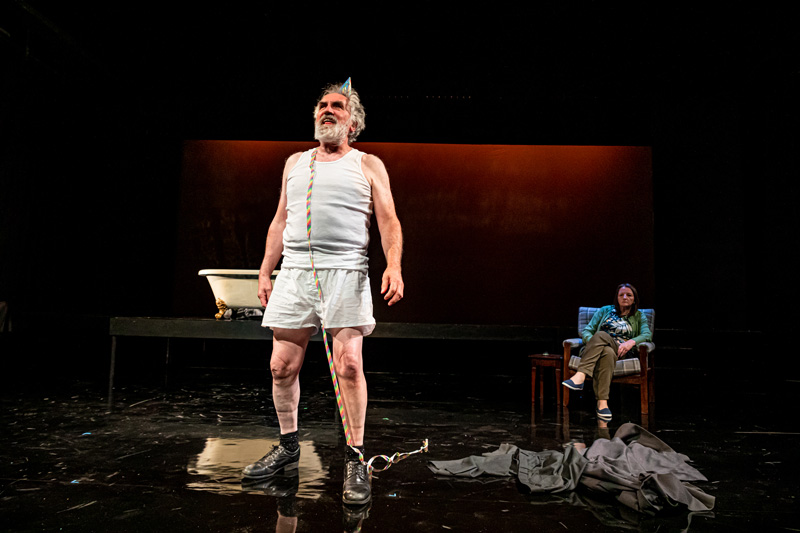
Gerry Mulgrew and Molly Innes in Still by Frances Poet. Photo credit: Lara Cappelli.
Still by Frances Poet, a major offering at the city’s principal producing theatre the Traverse, is a subtle multi-stranded essay about perception of pain, dysfunctional families, and the grim realities of our death throes.
Like Sweet FA, it is set in Edinburgh. There is a multiplicity of plots: a young woman (Naomi Stirrat) cannot bear to have her ailing pug dog euthanized, a sickly barfly wastrel (Gerry Mulgrew) wakes up on Portobello beach before going on a final bender in a detailed pub set that dominates stage left and features a bartender (Oğuz Kaplangi) who is also a multi-instrumental musician. Mulgrew’s character believes he’s dead, and if you take an absurdist view then perhaps he is. A woman must combat the crippling pain that is her fibromyalgia to see her grandchild though it’s possible her daughter-in-law is having a phantom pregnancy. Her son hates her with a vehemence that not even Tennessee Williams mother-son relationships can top: “You’re a black hole. Everything gets dragged into your orbit.” Each character, even the dog, is in pain and we are told that pain can neither be captured nor still less gauged; pain is what the sufferer says it is. Still is a mosaic of plots skilfully orchestrated by director Gareth Nicholls (who has overall responsibility for the Traverse) with points of tangential contact but no real commonality, this being a deliberate feature.
Towards the end, Still offers comfort and hope, but the rations are meagre. Its thesis (like Constellations reviewed by John Russell on another page) is that tiny changes in circumstance can have enormous impact on the direction of our lives. Decent gags abound. Mulgrew makes the imperishable observation, “She had an hourglass figure but one where the sand had slipped a bit.”
Some of the stage business appears laboured, and the production could do with another technical rehearsal. I don’t really connect with the piece until Stirrat performs an exquisite patter song at breakneck speed towards the end of the evening. The building blocks of the play remain distinct but there is an overall sense of affinity between the characters (all Edinburgh residents) that creeps up on me. Poet has the rare Beckettian ability (Mulgrew smacks of Krapp’s Last Tape) to find the memorable and lyrical in the ordinary. Her fine new play underlines that while none of us are exceptional, most of us can be stoic.
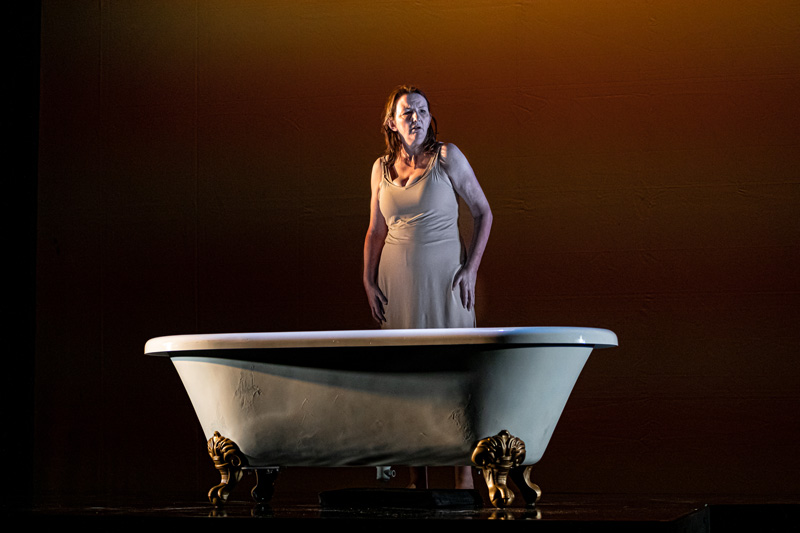
Molly Innes in Still by Frances Poet. Photo credit: Lara Cappelli.
Also at the Traverse, as part of the international festival, I see Enda Walsh’s new play Medicine. Directed by the playwright himself, it makes the flights of fancy in Still seem positively run-of-the-mill. The premise, if I’ve got it right (and the whole structure is dizzying) is that John (played by Domhnall Gleeson) is in an institution where he receives an annual session of drama therapy that is intended to heal his troubled psyche by acting out formative experiences in his life. The therapists are both called Mary, one seemingly caring (played by Aoife Duffin) and the other (played by Clare Barrett) much more sinister. The sessions are accompanied by an energetic on-stage drummer (Sean Carpio) with the atmosphere being more akin to a Broadway blockbuster than a piece of counselling. Oh, and the more threatening Mary is dressed in a Daliesque lobster costume. Hope all that is clear.
Just as in Joe Orton’s What the Butler Saw and Peter Weiss’ Marat/Sade, the caregivers seem to have more deep-rooted problems than the patient. I worried about the treatment being dished out and found it too flamboyant. John is wearing the kind of jimjams that tells you he would be restrained if he tried to leave whatever secure institution this is. The dominant, less caring Mary ensures that John is hamstrung whenever he tries to unravel some revealing information about his upbringing at the hands of brutal dysfunctional parents. Childhood is never far away, and the stage abounds in party materials, fizzy drinks, and candy.
The sound design by Helen Atkinson is an aggregation of many musical influences, and there is often a singalong chorus. The point (I believe) is that the protagonist no longer understands his own true roots in this potpourri of sounds and psychotropic colours. Metaphors abound; there is a delicious Pirandellian vein for a few minutes when the two Marys pretend to be inhabitants of the institution. It’s just possible that they are, which makes the experience more gruelling and put me in mind of David Storey’s Home which I’ll be reviewing at Chichester shortly. Medicine had its world premiere at the Traverse. It is a joint project by Landmark Productions and Galway International Arts Festival and headed straight for Galway after the Edinburgh run.
So, did I achieve anything in Edinburgh on this trip? It was a brief smash and grab raid, but I was able to gauge the muted tone and tepid atmosphere of a legendarily grey city in this difficult year. Staying in a decent hotel at a fraction of the price that I would pay during a “normal” Edinburgh Festival, I derived grim satisfaction when thinking about all the price-gouging would-be Airbnb landlords and landladies who must have taken a hammering this year. To say glibly that “Edinburgh will come back stronger next year” is Panglossian optimism. Society has changed. Perhaps festival-going will now be different. One aphorism from Francis Bacon haunts me: “Time is the only critic. Why do you want a critic to tell you what to think? Can’t you make your bloody mind up yourself?”

Aoife Duffin and Clare Barrett in Medicine. Photo credit: Jessica Shurte.


